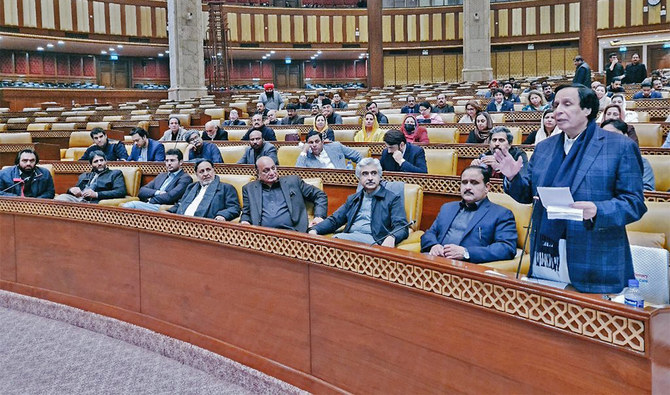ISLAMABAD: Punjab Chief Minister Chaudhry Parvez Elahi signed a summary for the dissolution of the provincial assembly on Thursday, said a senior official of former prime minister Imran Khan’s Pakistan Tehreek-e-Insaf (PTI) party, adding that Khyber Pakhtunkhwa’s legislature would also be dissolved on Saturday.
The development took place only a few hours after the chief minister got vote of confidence from the 371-member house and Punjab Governor Baligh-ur-Rehman withdrew his de-notification order concerning Elahi and his cabinet.
“The chief minister has signed the summary and sent the advice to the Punjab governor [to dissolve the assembly],” said PTI senior vice president Chaudhry Fawad Hussain while talking to the media in Lahore. “If the governor doesn’t accept the advice, the assembly will automatically stand dissolved after 48 hours.”
Pakistan’s constitution says the governor “shall dissolve the Provincial Assembly if so advised by the Chief Minister; and the Provincial Assembly shall, unless sooner dissolved, stand dissolved at the expiration of forty-eight hours after the Chief Minister has so advised.”
Hussain also announced the KP assembly, where the PTI was in power, would also be dissolved “day after tomorrow,” hoping that the dissolution of the two assemblies would pave the way for early national elections.
Since his ouster from power in a parliamentary no-confidence vote last April, ex-PM Khan has been pushing the federal government, led by Prime Minister Shehbaz Sharif, to hold snap polls in the country.
The Sharif administration has repeatedly declined his demand, saying the elections would be held on time. The national elections in Pakistan are scheduled to be held in October this year after the expiry of five-year term of all the assemblies.
Khan announced in November to dissolve the provincial legislatures of Punjab and Khyber Pakhtunkhwa where his party was in power to push the federal government for early elections.
“We have fulfilled our promise with the public that we will return to them [to seek a fresh mandate]. Imran Khan has fulfilled that promise,” Hussain said.
He informed the process to install an interim administration in Punjab would be initiated with a letter to the opposition leader in the assembly, adding the elections would be held within 90 days in the two provinces.
The PTI leader said the elections would be held on nearly 60 percent of the seats in the country and “we still feel the federal government should abandon its stubbornness, agree an electoral framework and move ahead for national elections.”
“Pakistani economy cannot prosper unless we bring stability through elections,” he maintained while urging the National Assembly speaker to accept 121 resignations of PTI lawmakers to hold elections of the national and provincial assembly seats at the same time.
Political analysts said former prime minister Khan was trying to “politically blackmail” the federal government and the newly appointed security establishment of the country by forcing them to agree to snap polls through the dissolution of assemblies.
“Khan is playing a trump card by dissolving the Punjab and KP assemblies and trying to create a political chaos to compel his political rivals to step down,” Owais Tohid, a senior political analyst, told Arab News.
He doubted the federal government led by Prime Minister Sharif would be willing to hold early general elections since its officials feel “they have already paid a heavy political cost by jacking up prices of utilities and taxes to fix the economy.”
“Mr. Khan is up for the final battle against his political rivals as he believes he could spring back to power by riding on his public popularity in the elections,” he said.
















